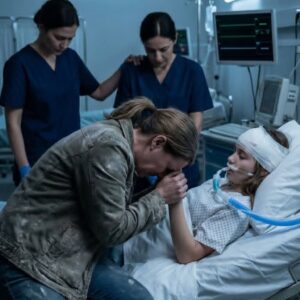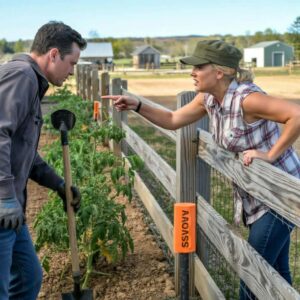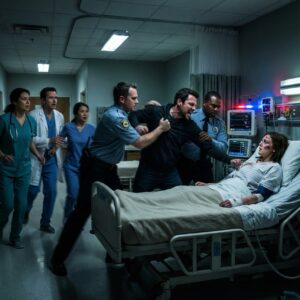The radio on my shoulder crackled with the familiar static of end-of-watch. 8:50 PM. Another long Friday shift in the bag. Just paperwork, then I’d grab some takeout and relieve Mrs. Henderson, our saint of an elderly neighbor who watched Lily after school. My phone buzzed, and Lily’s face, grinning with a missing front tooth, lit up the screen.
I tucked the phone between my ear and shoulder, signing the last arrest report. “Hey, Princess. Daddy’s almost done.”
“Daddy…” Her voice was small. Thin. It wasn’t her usual “five-more-minutes”-of-playtime voice. “My tummy hurts. It hurts really bad.”
I glanced at my watch. 8:51 PM. “Probably just a little gas, sweetie. I’ll be home in thirty minutes, okay? Did Mrs. Henderson give you dinner yet?”
“She made soup, but I couldn’t eat it.” There was a quiver in her voice that made the pen in my hand stop. “My tummy’s too big, Daddy. And it hurts.”
“Too big?” I chuckled, turning back to the report. “What’d you do, sneak extra cookies again?”
The silence on the other end was heavy. All I could hear was her shallow breathing. Then, in the background, Mrs. Henderson’s concerned, muffled voice. “Is that your father, Lily? Let me talk to him.”
My stomach tightened. “Lil, let me talk to Mrs. H.”
A second of rustling, and then, “Mark? I… I think you should come home. Now.”
The casual humor I’d felt a second ago evaporated. Mrs. Henderson isn’t an alarmist. She’s an ex-nurse who has seen it all.
“What’s going on?” I was already standing, grabbing my keys.
“She’s been crying about stomach pain all afternoon, Mark. I thought it might pass, you know, just something she ate. But she’s looking… well, she’s pale. And her abdomen. It seems… swollen.”
“Swollen?” I was already moving through the precinct, ignoring the “night, Sarge” calls from my guys. “How swollen?”
“It’s hard to explain,” she said, her voice shaky. “It wasn’t like this yesterday. It just doesn’t seem right.”
Twenty minutes. That’s how long it took me to hit the suburbs, lights and siren off but my foot heavy on the gas. I burst through my own front door, still in my uniform, my duty belt digging into my hip.
The scene in my living room stopped my heart.
Lily was curled on the couch, her face chalk-white and slick with sweat. Her favorite stuffed rabbit, “Hoppy,” was clutched against her, but it wasn’t in its usual spot by her chin. It was resting on her stomach, and it was… high.
“Thank goodness,” Mrs. Henderson whispered, ringing her hands. “She’s been getting worse.”
I knelt, and my training as a cop, as a first responder, took over. “Hey, Lily-pad,” I said, my voice gentle, but my eyes were scanning. “Can you show Daddy exactly where it hurts?”
She didn’t just point. Her little hand weakly indicated her entire lower abdomen. Her blue eyes, usually so bright, were swimming with tears.
“Okay, baby. I’m just going to move Hoppy, all right?”
I lifted the stuffed rabbit. And my breath caught in my throat.
This wasn’t “gas.” This wasn’t “extra cookies.”
My five-year-old daughter’s stomach was protruding. It was visibly swollen, rounded, and tight as a drum. It looked… it looked impossibly, grotesquely wrong.
“How long?” I asked, my voice barely a whisper, trying to keep the panic from my face. “How long has it been like this?”
“It started hurting last week,” Lily whispered, a tear rolling into her hair. “But… but it got really big today.”
Last week. The words hit me like a stab. Last week. I’d been working doubles, covering my partner’s leave. Five doubles in a month. I’d seen my daughter for maybe an hour a day, most of it while she was sleeping. I’d kissed her forehead, noticed she was a little quiet, and chalked it up to being tired. The guilt was a physical, crushing weight.
“Okay, Lily-pad,” I said, my voice shaking as I scooped her into my arms. “We’re going to take a little ride. We’re going to see the doctors, and they’re going to make that tummy feel all better.”
The emergency room was a blur of fluorescent lights and the smell of disinfectant. I used my badge to get past the intake desk, my voice clipped. “My daughter. Five years old. Acute abdominal distension.”
They had us in a room in seconds. The triage nurse’s professional smile faltered as soon as she lifted Lily’s shirt. She exchanged a look with another nurse—a look I knew. It was the “oh, shit” look. The look cops give each other at a scene that’s about to go very, very bad.
She stepped out. Minutes later, she was back with Dr. Collins, a woman with kind eyes and a concerned line between her brows.
“Officer Wilson,” she said, “I’m Dr. Collins. I’d like to run some tests on Lily immediately. We need a clearer picture.”
They wheeled in the ultrasound machine. I held Lily’s small, cold hand, telling her it was just like the jelly they used on TV. The technician, a young woman, was all business… until she wasn’t.
She spread the gel on Lily’s swollen belly. She pressed the transducer to her skin. And she froze.
Her hand literally stopped moving. Her professional mask slipped, her eyes went wide, and she looked at the screen with an expression of pure, unadulterated shock.
“Dr. Collins,” she said, her voice quiet. “You… you need to see this.”
The doctor leaned in. She stared at the monitor. Her face went from concerned to gravely serious. The blood drained from her face.
“Officer Wilson,” Dr. Collins said, her voice careful, almost a whisper. “I need to speak with you outside. Please.”
I glanced back at Lily, who looked so small on that big table, clutching Hoppy. Her eyes, full of trust, followed me. “It’s okay, Daddy,” she whispered.
I followed the doctor into a small, sterile consultation room. My heart was a battering ram against my ribs. My police training was screaming calm, objective, assess, but the father in me was just screaming.
“Please, sit down, Officer—”
“I’ll stand,” I said, my voice harsher than I intended. “What is wrong with my daughter?”
Dr. Collins clasped her hands. “The ultrasound shows a mass in Lily’s abdomen. It’s… substantial. Which explains the swelling.”
“A mass?” My mouth went dry. “Like a… a tumor?”
“We can’t confirm without more testing,” she said, avoiding my eyes. “But, Officer Wilson, there are… unusual characteristics. The structure. It has components that are… highly organized. It’s not typical.”
“What does that mean? ‘Highly organized’? Speak English, Doctor.”
She hesitated, then turned her tablet around, showing me the grainy, black-and-white image. It was a chaotic swirl of grays, but in the center…
“See this area?” she said, pointing. “It has distinct features… At first glance, the ultrasound… it appears to show a… a developing fetus.”
The word “fetus” hung in the air. The room went silent. The only sound was the high-pitched ringing in my ears.
“A what?” I whispered. My voice rose, cracking. “That’s impossible. She’s five. Are you telling me my five-year-old daughter is…” I couldn’t say the word.
“Medically, what you’re thinking would be impossible,” Dr. Collins said quickly. “Which is why we are so concerned. We don’t know what this is. But the resemblance is what caused our initial alarm.”
The implication, the one she wasn’t saying, hit me like a physical blow. The reason for the alarm. The reason she pulled me outside. The reason the technician looked horrified. They weren’t looking at a medical miracle. They were looking for a monster.
“We had to consider all possibilities,” she said gently.
“You think someone…” I choked on the word. “You think someone hurt her?”
“We have to rule it out,” she said, her voice firm but kind. “We need to run blood tests, get a more detailed CT scan. I’m calling in our pediatric specialist, Dr. Patel.”
Before I could process any of this, she continued, “And, Officer Wilson… hospital protocol in a situation with this much ambiguity… it requires us to make a call.”
“What call?”
“I’ve contacted Child Protective Services. They’re sending a representative.”
Child Protective Services. CPS. I’m a cop. I’ve made those calls. I’ve stood by while social workers removed kids from horrific situations. And now… now they were coming for me.
“You think I did this?” My voice was trembling, a mix of rage and pure, unfiltered terror.
“We don’t think anything, Officer,” she said. “We are following procedure to protect your daughter. Our priority is finding out what this mass is and how it got there.”
I stumbled back into the room. Lily looked up at me. “Can we go home now, Daddy?”
I forced a smile that felt like broken glass. “Not yet, Lily-pad. The doctors need to take some more pictures.” I sat down, my legs giving out, and took her hand. I was no longer just a worried father. In the eyes of this hospital, I was a suspect.
The night was a living nightmare. They moved Lily to a private room. I sat in the hard plastic chair, watching her sleep, my phone buzzing relentlessly. My partner, James. My captain. I ignored them all.
Then Dr. Patel arrived, all business. He reviewed the scans, his expression unreadable. He started asking questions.
“Officer Wilson, is Lily’s mother involved in her care?”
The question was a familiar ache. “Her mother… Sarah… she left about eight months ago. She struggled with her mental health. She’s not in the picture.”
“And who watches Lily when you’re working?”
“My neighbor, Mrs. Henderson. Or the after-school program. Why? What does this have to do with anything?”
“We need a complete picture of Lily’s environment, Officer.”
It was then I noticed them. Two security guards, posted in the hallway. Not for my protection. To watch me.
Later, a woman in a business suit arrived. Ms. Reyes. From CPS. She was smooth, professional, her questions polite but weighted with accusation. “When was Lily’s last wellness check, Officer Wilson?”
I… I couldn’t remember. My mind was blank. I’d been working doubles since James’s wife had her baby. The guilt was suffocating. I’d been so focused on paperwork and overtime that I’d missed my own daughter’s last checkup. I’d missed a week of her complaining about her stomach.
“I… I’m not sure,” I stammered.
Ms. Reyes made a note. “And you’re the sole caregiver? You’ve been working a significant amount of overtime, I understand?”
“I’m a single father,” I snapped. “We needed the money.”
“Of course.” Her smile didn’t reach her eyes.
The whispers started at the nurse’s station. I could hear them. “The cop’s kid.” “Five years old.” “Impossible.” The media got the scent. A man with a camera was escorted out of the lobby. The hospital administrator, a man named Brennan, informed me that “unusual medical cases generate attention” and that they’d received “media inquiries.”
My world was spinning out of control. My daughter was sick, and I was being investigated for it.
The morning brought the doctors. Collins, Patel, and a new one, Dr. Martinez, the chief radiologist.
“We have an answer,” Dr. Patel said, his face grim. “The mass… it’s a teratoma.”
“A what?”
“A rare type of tumor,” Dr. Martinez explained, pulling up the new, clearer CT scans. “They’re bizarre growths. They can contain different types of tissue. Hair, bone, teeth… sometimes, on an ultrasound, they can be highly organized and mimic… other structures.”
“So… she’s not…”
“No,” Dr. Collins said firmly. “She is not pregnant. That is medically impossible. This is a tumor. A one-in-a-million medical anomaly.”
The relief was so profound I almost collapsed. She was sick. Just… sick. Not… not the other.
“But,” Dr. Patel continued, “there’s a complication. Dr. Martinez, show him.”
The radiologist zoomed in on the image. There, inside the chaotic mass of the tumor, was a small, dense, perfectly artificial shape.
“What is that?” I asked.
“We’re not sure,” Dr. Patel said. “But it appears to be a foreign object. We believe… we believe she swallowed something, and it lodged in her tissue. The body, in its confusion, built this… this teratoma… around it, trying to wall it off.”
“She swallowed something?” A thousand images flashed in my mind. Coins. Marbles. “Just a toy, Sarah.”
“Daddy?” Lily’s voice. She was awake. “Why is everyone looking at me funny? Did I do something bad?”
I rushed to her side, my heart breaking. “No, Lily-pad,” I whispered, stroking her hair. “You didn’t do anything bad at all.”
The relief of the diagnosis was short-lived. My partner, James, showed up. “Captain sent me, Mark,” he said, avoiding my eyes. “Officially. I have to ask you about Sarah. About your shifts.”
I was being questioned. By my own partner. “There’s no welfare concern, James! It’s a tumor!”
“I know, Mark,” he said, “but the initial scans… protocols were activated. And honestly? A kid with a serious condition that went unnoticed? A single dad working five doubles last month? It doesn’t look good.”
He was right. I’d been so buried in work, so lost in my own exhaustion since Sarah left, that I’d missed it. I’d dismissed the stomach aches. I’d let her skip a checkup.
Then Ms. Reyes from CPS returned, this time with a child psychologist. “We’d like to speak with Lily, Officer. Alone.”
“No,” I said, standing. “I’ll be present.”
“Children speak more freely without parents present,” the psychologist, Ms. Chen, said gently. “Especially in cases involving…”
“There is no case!” I roared. “My daughter is sick!”
“Mark,” James said, putting a hand on my shoulder. “Let them do their job. It’s the only way to clear this.”
I had to walk out. I had to stand in the hallway, watching through a small window as strangers questioned my five-year-old daughter, looking for signs of trauma I had caused.
It was then that Dr. Patel and Dr. Collins rushed out of a conference room. “Mark, we need you. We’ve identified the foreign object. And it changes everything.”
In the conference room, the scan was on a big screen. “It’s a small plastic capsule,” Dr. Patel said, pointing to the image. “The kind you find in surprise eggs. Vending machine toys.”
A toy. A stupid, fifty-cent toy.
“Children swallow things,” Dr. Collins explained. “But this… we believe this specific toy is the trigger. We think it contains chemicals. The body has tried to contain it.”
The relief was so total I slumped into a chair. “So… no one… no one hurt her.”
“No,” Dr. Patel said. “This is a medical anomaly. We’re informing CPS.”
But the chaos was just starting. “Someone leaked the initial ultrasound images,” the hospital administrator, Brennan, said, bursting in. “The ones that looked like a pregnancy. Social media is on fire. Conspiracy theories. Accusations. Reporters are trying to get past security.”
My phone exploded. My in-laws, Sarah’s parents, were on their way, threatening to seek emergency custody for neglect. The story was going national. “MYSTERY 5-YEAR-OLD PREGNANCY.”
“We need to operate,” Dr. Patel said, cutting through the noise. “Now.”
I kissed Lily’s forehead as they wheeled her away. “I’ll be right here when you wake up, princess. Wild horses couldn’t keep me away.”
As the elevator doors closed, I turned to face the storm.
The wait was agony. I paced. I prayed. I drowned in guilt. The vending machine at the grocery store. “Just one, okay, we need to hurry.” My phone had rung. A work call. I hadn’t even watched her open it.
Mrs. Henderson. “She’s been saying her tummy hurts a lot.” “I’ll get her checked out when I have time.”
When I have time.
Ms. Reyes from CPS found me. “We’re closing our investigation, Officer,” she said, her voice soft. “But we found something. Lily was taken to three different walk-in clinics in the last two months. All for stomach pain.”
“What? I never took her to a clinic.”
“Mrs. Henderson did,” Ms. Reyes said. “Your neighbor. Each time, they diagnosed minor digestive issues and sent her home.”
My neighbor, the elderly woman I paid to watch my kid, had been more of a parent than I had. She’d tried. She’d taken her to doctors. And the overworked, understaffed system had failed her, just as I had.
Then Sarah’s parents, Eleanor and Richard, found me. “Where is she?” Eleanor demanded, her face tight with anger.
Before I could answer, Dr. Patel appeared, still in his scrubs. “Officer Wilson. We’ve completed the first phase. We’ve extracted the object.”
He showed it to me. A tiny, partially dissolved plastic capsule. A melty-looking toy princess inside. “It’s not just the plastic,” Dr. Patel said. “It’s made of a non-standard polymer. It’s leaching industrial chemicals. Chemicals not approved for consumer products.”
A memory, sharp and sudden, cut through my exhaustion. An argument with Sarah, just before she left. She was holding a small toy. “Mark, these cheap things are dangerous,” she’d said, “There was a recall in California. They’re toxic.”
“You’re overreacting, Sarah,” I’d told her, dismissing her as paranoid, as sick. Three days later, she was gone.
My God. She had been right. She had tried to warn me.
The case exploded. The chemical was an industrial binding agent, banned five years ago. Other kids in the city had similar tumors. The vendor outside Lily’s school was arrested. His supplier? A warehouse owned by Councilman Harris’s brother-in-law. An investigation I’d been personally ordered to stop last year.
And then, the final piece. “Mark,” James said, his face pale. “We found the original consumer safety complaint about these toys. The one that was buried by Harris’s office. It was filed eight months ago. By Sarah Wilson. Your wife.”
Lily woke up the next morning. “Daddy?” she whispered. “My tummy doesn’t hurt.”
“They fixed you, princess.”
“Was it the surprise egg?” she asked, her voice clear. “The little princess was all melty and sticky. I tried to fix it… and then I accidentally swallowed it when Mrs. Henderson called me for lunch.”
She hadn’t told me. Because I was “too busy with work.”
A soft knock. I thought it was the doctor.
The door opened. And she stood there. Thin, pale, her eyes the same as Lily’s, but haunted.
“Sarah,” I breathed.
“Mommy?” Lily whispered from the bed, her eyes wide with joy.
Sarah rushed to her, sobbing. “Hi, baby girl. The hospital… my parents… they called me.” She looked up at me, tears streaming down her face. “They told me. About the toy. You… you tried to warn me,” I said, the words thick with shame. “I didn’t listen.”
“And I left,” she whispered. “I left instead of staying to fight. We both made mistakes, Mark.”
Lily’s testimony was the final nail. She’d seen Councilman Harris with the toy vendor at her school. She saw him get paid.
We held a press conference. The hospital, the public health department, me, and Sarah. We stood side-by-side. I told the truth. “My daughter nearly died because multiple systems failed,” I said, my voice shaking. “The regulatory system, the political system, the healthcare system… and I failed, as a father, by not listening.”
Sarah stepped up. “I tried to report this,” she said, her voice strong. “I was dismissed as paranoid and unstable. This isn’t just about a toy. It’s about a system that silences those who try to sound the alarm.”
The day Lily was discharged, we didn’t go home. We went to her grandparents’ house. Sarah, too. There was so much to heal. So much broken.
Six months later, we stood in a park. The Lily Wilson Foundation for Consumer Safety was holding its first health fair. Councilman Harris was facing criminal charges. The clinics had new funding.
Lily, fully recovered, ran circles around us, laughing.
“We still have a long way to go, don’t we?” Sarah asked, her hand brushing mine.
“We do,” I said, taking it. “But for the first time in a long time, I think we’ll get there.”
I’d been a cop, trained to see the world in black and white. But the real world was messy. It was gray. It was a five-year-old girl whose stomach ache was a tumor, a conspiracy, and the only thing that could save her family. I had to almost lose my daughter to finally learn how to be a father





